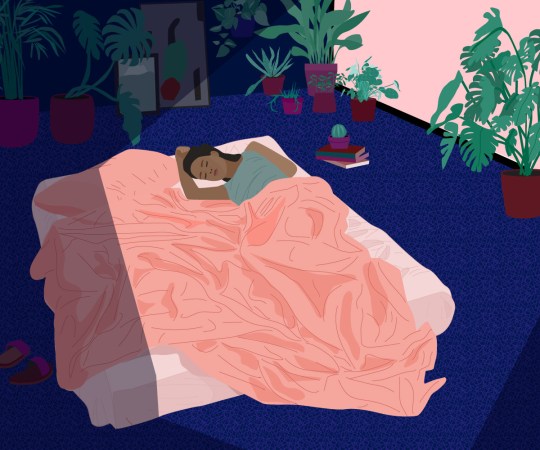We may earn revenue from the products available on this page and participate in affiliate programs.
My relationship with sleep, for the past 10-odd years, has been similar to my relationship with dairy: More often than not, I want it in vast quantities, but when I get just that, I somehow end up feeling worse. Other times, I crave it so desperately that even when I do experience it, I don’t end up feeling fulfilled. Then, on the rarest occasions of all, it’s perfect. I have just enough, at just the right time, and I end up feeling great.
I never thought that swapping out something as simple as my pillow could help me sleep well every single night. But then I found Pluto. And after a mere week, I changed my tune.
What’s the deal?
Pluto Pillow is a direct-to-consumer brand that specializes in—you guessed it—pillows. All you have to do is take a quick quiz, and seven days later, you’ll have your own pillow that’s been calibrated according to your height, weight, body temperature, and sleep style.
In a world flush with direct-to-consumer sleep brands, it seemed to company founder Susana Saeliu that pillows, by and large, were ignored. “The way we shop for pillows has largely remained unchanged,” she says. “We visit a local store, test out aisles of options with our hands, squeezing pillows that are soft, medium, or firm, and realizing that what’s firm from one brand can feel more like a medium from another.”
Why is it necessary?
Pillow talk, it seems, has been long missing from our conversations on how to get better sleep—and I knew I was definitely guilty. As soon as I moved into my first apartment, I invested in high-quality sheets and a fluffy duvet cover that I knew would help me relax at night. Eventually, I also opted for a comfy, supportive bed-in-a-box mattress. My pillows, however, had followed me throughout college. One or two of them were likely scrounged up from a linen closet in my childhood home.
See, I like to sleep with a lot of pillows. On my full-size bed, I have four standard-size pillows (which, yes, I’ve amassed mainly for aesthetic purposes), but also two 20-inch square throw pillows and two small, decorative lumbar pillows. Okay, and two crocheted amigurumi Totoros.
So does it actually work?
After tossing and turning at the beginning of each night, I eventually settled into a configuration that felt comfortable enough for me to fall asleep. Then I got a Pluto pillow, and I stopped tossing and turning. I slept on just this one, singular pillow. And finally—finally—I started falling asleep at a convenient time.
According to Saeliu, the Pluto pillow can be configured more than 30 ways. After all, there are plenty of factors that contribute to the different ways you get your shut-eye. “We conducted research through interviews with consumers about their pillows, a somnologist to understand the fundamentals of quality sleep, and a chiropractor to learn more about how the wrong pillow can contribute to neck pain and other problems,” Saeliu explains. “All of this information was used to create a database and an algorithm that would calculate the best pillow variation for a person—and the algorithm continues to improve with more orders and customer feedback.”
More than two months have passed since I received my Pluto pillow, and I consider my skepticism fully eviscerated. Opting for a pillow totally customized for my sleep habits has seemingly solved the princess-and-the-pea problems I didn’t realize I’d been having all along, helping me to fall asleep faster and wake up—shock of all shocks—well rested.
Now I sleep on just a single pillow—but I’ll keep the others around just for fun.
See more ways to get better sleep: Can Breathing Mindfully Help You Sleep Better?Plot Twist: The Key to Better Sleep Is Not a Bedtime—It’s a Wake-Up TimeObsessed With CBD? Its Sleep-Inducing Sibling Might Be Even Better












